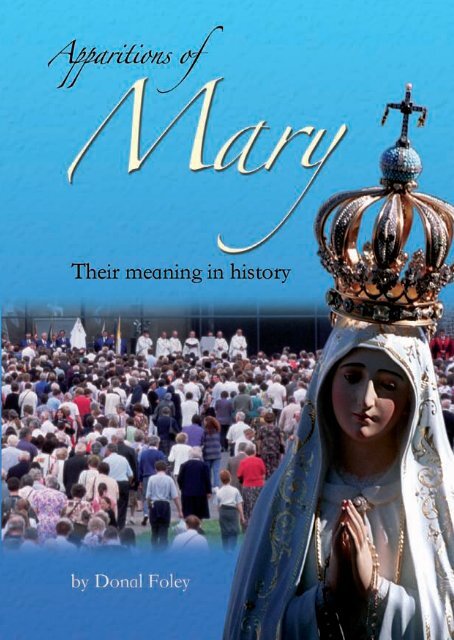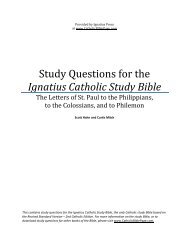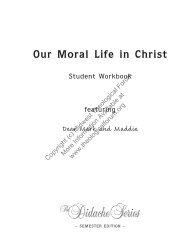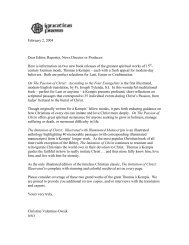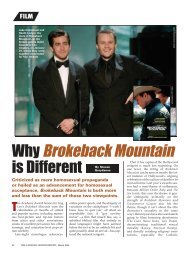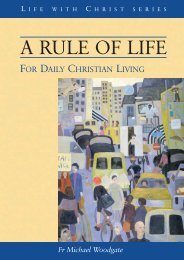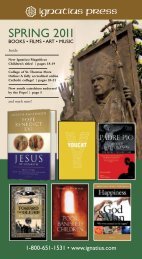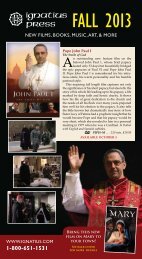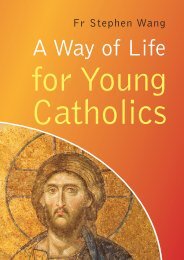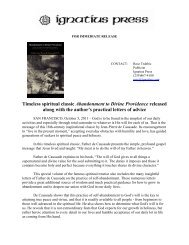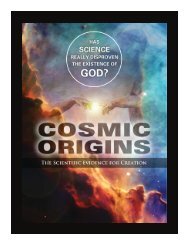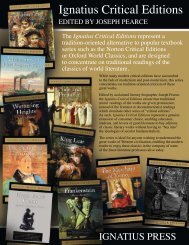apparitions of mary - Ignatius Press
apparitions of mary - Ignatius Press
apparitions of mary - Ignatius Press
You also want an ePaper? Increase the reach of your titles
YUMPU automatically turns print PDFs into web optimized ePapers that Google loves.
Catholic Truth Society Publications<br />
Distributed by <strong>Ignatius</strong> <strong>Press</strong><br />
Catholic Truth Society and <strong>Ignatius</strong> <strong>Press</strong> have joined<br />
forces to make CTS’s outstanding booklets available in North<br />
America. CTS booklets explain the faith, teaching, and life<br />
<strong>of</strong> the Catholic Church. They are based on Sacred Scripture,<br />
the Second Vatican Council documents, and the Catechism <strong>of</strong><br />
the Catholic Church. These booklets provide authentic<br />
Catholic teaching; they address issues <strong>of</strong> life and truth which<br />
are relevant to all. They aim to inform and educate readers on<br />
the many issues that people have to deal with today.<br />
www.ignatius-cts.com<br />
All rights reserved. Copyright © 2000, The Incorporated<br />
Catholic Truth Society <strong>of</strong> London. Distributed in North<br />
America by <strong>Ignatius</strong> <strong>Press</strong>, San Francisco, CA.<br />
ISBN 978 1 86082 082 3<br />
Front cover image: Statue <strong>of</strong> the Virgin <strong>of</strong> Fatima © PIZZOLI<br />
ALBERTO/CORBIS SYGMA, Crowd scene © Michael St.<br />
Maur Sheil/CORBIS.
APPARITIONS OF MARY<br />
- THEIR MEANING IN HISTORY -<br />
by<br />
Donal Anthony Foley<br />
All booklets are published thanks to the<br />
generous support <strong>of</strong> the members <strong>of</strong> the<br />
Catholic Truth Society<br />
CATHOLIC TRUTH SOCIETY<br />
PUBLISHERS TO THE HOLY SEE
CONTENTS<br />
Introduction ..............................................................................3<br />
Guadalupe, the Reformation, and Secularisation .................7<br />
The Reformation ...................................................................7<br />
The Apparitions at Guadalupe - 1531 .................................10<br />
The Enlightenment, French Revolution,<br />
and Catholic Revival ..............................................................18<br />
The French Revolution ........................................................19<br />
The Apparitions at Rue du Bac - 1830 ................................21<br />
Jacob, Joseph and the Miraculous Medal ............................23<br />
La Salette Apparition - September 1846 .............................27<br />
La Salette and Moses ..........................................................29<br />
Lourdes and Darwin’s theory <strong>of</strong> Evolution .........................32<br />
Bernadette and Lourdes - 1858 ...........................................32<br />
Moses and Bernadette ........................................................36<br />
Pontmain and Knock Apparitions ........................................41<br />
The Apparition at Pontmain - 1871 .....................................41<br />
The High Priest ....................................................................46<br />
Knock Apparition - 1879 ....................................................50<br />
Fatima and the Russian Revolution ......................................54<br />
The Apparitions at Fatima - 1917 .......................................54<br />
The Miracle <strong>of</strong> the Sun - October 1917 ..............................60<br />
Fatima and Elijah ................................................................65<br />
Beauraing, Banneux, and the rise <strong>of</strong> Nazism .......................68<br />
The Apparitions at Beauraing, 1932-33 ..............................71<br />
The Eastern Gate and Beauraing .........................................74<br />
The Apparitions at Banneux - 1933 ....................................76<br />
Beauraing, Banneux, and Nazism .......................................81<br />
Conclusion ...............................................................................84
INTRODUCTION<br />
This booklet looks at the nine major Marian <strong>apparitions</strong><br />
that have occurred during the last five centuries or so, and<br />
which the Catholic Church has decided to accept as<br />
authentic. It relates them to secular happenings, exploring<br />
the idea that they parallel important “revolutionary”<br />
events in modern Western history, such as the<br />
Reformation, the French and Russian Revolutions, and<br />
the rise <strong>of</strong> Nazism. It is argued that the major modern<br />
<strong>apparitions</strong> <strong>of</strong> the Mother <strong>of</strong> Jesus, as approved by the<br />
Catholic Church, and particularly Fatima, are not random<br />
or historically inconsequential events, but actually seem<br />
to follow a preordained plan. Thus they have a crucial<br />
importance if we are to understand the events <strong>of</strong> the last<br />
five hundred years which have so shaped the modern<br />
world. The cumulative effect <strong>of</strong> these revolutions has<br />
been the development <strong>of</strong> the present immoral and unjust<br />
world-wide civilisation, which has been aptly described<br />
by the Pope as a “culture <strong>of</strong> death.”<br />
However, there is a remedy to all this evil and that is<br />
acceptance <strong>of</strong> the teaching <strong>of</strong> the Church, particularly as<br />
it is expressed in the message <strong>of</strong> Fatima. The power <strong>of</strong><br />
this message is evident in the huge changes that have<br />
taken place in Russia and its former satellites since the<br />
3
4<br />
A PPARITIONS OF M ARY<br />
collegial consecration carried out in 1984 by Pope John<br />
Paul II. Russia has not yet been converted but it is evident<br />
that the power <strong>of</strong> communism has been largely broken.<br />
This evil though has been replaced by another in the form<br />
<strong>of</strong> a global atheistic ideology, one based on materialistic<br />
evolution, which threatens to destroy any remnants <strong>of</strong><br />
Christian morality.<br />
In answer to the threat represented by these successive<br />
revolutions, Mary has repeatedly appeared and asked for<br />
repentance, a turning away from sin, if the most awful<br />
disasters are to be avoided. As the spiritual Mother <strong>of</strong><br />
mankind she cannot stand idly by and watch humanity<br />
destroy itself through sin and selfishness. Her <strong>apparitions</strong><br />
have played a large part in the major Catholic renewals <strong>of</strong><br />
recent centuries, and if the message <strong>of</strong> Fatima is heeded<br />
then the Church can again experience a renaissance. As the<br />
details <strong>of</strong> the Fatima message make clear, this is necessary<br />
if we are to have true peace in the world.<br />
This booklet also explores some interesting typological<br />
affinities between the Marian <strong>apparitions</strong> and incidents<br />
found in the Bible. That is it looks at the idea that each <strong>of</strong><br />
the <strong>apparitions</strong> has a biblical type, a symbolic<br />
representation, in the same way that many <strong>of</strong> the<br />
incidents in the Gospel accounts <strong>of</strong> Jesus have an Old<br />
Testament type to which they correspond. An example <strong>of</strong><br />
this is the typological identification made between<br />
Abraham’s son Isaac, who carried the wood for his own
I NTRODUCTION 5<br />
sacrificial fire on his back, and Christ, who carried the<br />
cross on his back to Calvary (Gen 22:1-19; Jn 19:17).<br />
These typologies mainly concern biblical types <strong>of</strong> Mary<br />
identified by the Church Fathers, and found between the<br />
books <strong>of</strong> Genesis and Ezekiel.<br />
Looking at the historical processes which have led to<br />
the modern world, in the light <strong>of</strong> the Marian <strong>apparitions</strong>,<br />
we can say that the Protestant Reformation represents the<br />
crucial break in the ideal and reality <strong>of</strong> Christendom, with<br />
Guadalupe in Mexico, in 1531, being Mary’s response to<br />
that particular revolution. The events connected with<br />
Catherine Labouré and the miraculous medal at Rue du<br />
Bac in 1830, which coincided with the Paris Revolution<br />
<strong>of</strong> that year, happened in the aftermath <strong>of</strong> the French<br />
revolution. Likewise, the apparition at La Salette in 1846<br />
took place shortly before the European revolutionary<br />
outbursts <strong>of</strong> 1848, while Lourdes in 1858 occurred just a<br />
year before the publication <strong>of</strong> Charles Darwin’s Origin <strong>of</strong><br />
the Species, an event which represents the beginning <strong>of</strong><br />
the modern atheistic intellectual revolution. The<br />
apparition at Pontmain in France, in 1871, took place at<br />
the time <strong>of</strong> the Franco-Prussian War, while the apparition<br />
at Knock in Ireland, in 1879, fortified the Irish in their<br />
struggle against religious and social oppression. The<br />
<strong>apparitions</strong> at Fatima in Portugal, in 1917, took place just<br />
as the Russian Revolution was unfolding, while those at<br />
Beauraing and Banneux, in 1930s Belgium, happened
6<br />
A PPARITIONS OF M ARY<br />
just as Hitler was coming to power in Germany. The<br />
above nine major <strong>apparitions</strong>, which are generally<br />
recognised as the most important Marian <strong>apparitions</strong>,<br />
have all enjoyed various degrees <strong>of</strong> Church recognition.<br />
In most cases this has included Episcopal sanction,<br />
liturgical grants, the building <strong>of</strong> a basilica, and Papal<br />
approval, as well as continuing large scale pilgrimages.
GUADALUPE, THE REFORMATION, AND<br />
SECULARISATION<br />
The Reformation<br />
The link between important historical revolutions and the<br />
Marian <strong>apparitions</strong> is evident in the case <strong>of</strong> Guadalupe in<br />
Mexico, which occurred in 1531, only fourteen years<br />
after the beginning <strong>of</strong> the Reformation in 1517. In reality<br />
the Reformation was the first stage in the long revolt<br />
against the Church, truth, and reason, which has been<br />
going on ever since, a revolt that destroyed the unity <strong>of</strong><br />
medieval Christendom and ushered in the modern secular<br />
age. It is true that the Church was in need <strong>of</strong> reform, but<br />
the revolutionary movement begun by Luther in 1517<br />
was really a rejection <strong>of</strong> fifteen hundred years <strong>of</strong> history<br />
and tradition, <strong>of</strong>ten carried out with brutal force and the<br />
covert intention <strong>of</strong> seizing Church property. It was not a<br />
genuine religious reform. Luther’s ideas on justification<br />
by faith alone, and his emphasis on the Bible, were meant<br />
to return the Church to a “golden age” before it had been<br />
corrupted by “priestcraft.” But the main results <strong>of</strong> his<br />
work were the destruction <strong>of</strong> Christendom and the<br />
introduction <strong>of</strong> a corrosive questioning attitude to all<br />
aspects <strong>of</strong> medieval society.<br />
7
8<br />
A PPARITIONS OF M ARY<br />
Our Lady <strong>of</strong> Guadalupe (detail). By kind permission <strong>of</strong> Br Francis<br />
Mary <strong>of</strong> the Academy <strong>of</strong> the Immaculate.
G UADALUPE 9<br />
All the upheavals <strong>of</strong> the preceding centuries, including<br />
the Avignon Papacy, the Great Schism, and the Black<br />
Death, had a cumulative negative effect on medieval<br />
society. Respect for authority, both religious and secular,<br />
declined, and this also effected morality. All this took<br />
place against a background <strong>of</strong> social, educational, and<br />
technological change that unsettled people’s minds and<br />
made them susceptible to new ideas and simplistic<br />
solutions to very difficult problems. Germany in<br />
particular was in a state <strong>of</strong> ferment in the early sixteenth<br />
century, with a weak central government and antagonism<br />
between the different social classes. Humanistic ideas had<br />
become a serious rival to the teachings <strong>of</strong> the Church, as<br />
people began to lose sight <strong>of</strong> the central role <strong>of</strong> the<br />
Papacy. In addition, the great wealth <strong>of</strong> the Church began<br />
to seem very tempting to those who wanted to get their<br />
hands on ecclesiastical lands. Heavy taxes and financial<br />
abuses, particularly in the area <strong>of</strong> indulgences, led to<br />
feelings <strong>of</strong> exasperation, especially when it seemed as<br />
though Rome and the Renaissance Popes were unable or<br />
unwilling to do anything much to remedy all this. Thus<br />
the stage was set for the religious and political revolution<br />
we call the Reformation.<br />
Spanish explorers began to colonise the Caribbean<br />
area after the discovery <strong>of</strong> the Americas in 1492, but it<br />
was not until 1519 that the Aztec empire, in what is now<br />
Mexico, was conquered by Cortés. Christianity was slow
10<br />
A PPARITIONS OF M ARY<br />
to take root in the country and thus Mary appeared to<br />
Juan Diego in December 1531, preparing the way for the<br />
conversion <strong>of</strong> millions <strong>of</strong> believers in the New World,<br />
just as so many were being lost to Protestantism in<br />
Europe. 1531 is an important year because it represents<br />
the moment when the Protestant revolt had grown to such<br />
proportions that it was a real threat to the Habsburg<br />
empire. In February 1531 the Lutheran rulers set up the<br />
Schmalkaldic League, an anti-imperial alliance centred<br />
on the Protestant areas <strong>of</strong> Germany; this was an<br />
indication that Protestantism as a political force had<br />
become firmly established. At this time Spain was rapidly<br />
becoming the most powerful country in Europe, one that<br />
was to prove the mainstay <strong>of</strong> the Catholic Reformation,<br />
so perhaps it was appropriate that the first great Marian<br />
apparition <strong>of</strong> the modern age should have occurred in the<br />
new Spanish territory <strong>of</strong> Mexico.<br />
The Apparitions at Guadalupe - 1531<br />
Juan Diego, the seer <strong>of</strong> Guadalupe, was a recently<br />
baptised adult convert, aged 57, when Mary appeared to<br />
him in 1531 at Tepeyac hill, formerly the site <strong>of</strong> a pagan<br />
temple. His wife had died in 1529 and he was now living<br />
with his uncle. On his way to Mass on 9th December, the<br />
feast <strong>of</strong> the Immaculate Conception at the time throughout<br />
the Spanish Empire, he saw an apparition <strong>of</strong> a beautiful<br />
young girl, who looked about fourteen, surrounded by
G UADALUPE 11<br />
light. She gently asked him where he was going, and he<br />
told her he was going to Mass; she smiled in approval<br />
before telling him that she was “the perfect and ever<br />
Virgin Holy Mary, Mother <strong>of</strong> the God <strong>of</strong> truth through<br />
Whom everything lives, the Lord <strong>of</strong> all things near us, the<br />
Lord <strong>of</strong> heaven and earth.”<br />
She promised the people her love, compassion, and<br />
protection, and requested that he go to Bishop Zumarraga<br />
and ask that a “little house” be built for her there. This Juan<br />
Diego did but the result was that he was initially rebuffed<br />
by the perplexed bishop. He went back towards Tepeyac<br />
hill and the route home, to find Mary waiting for him. He<br />
recounted the details <strong>of</strong> his meeting with the bishop,<br />
before asking the “noble Lady” to entrust her mission to<br />
someone more important. She, however, just smiled, and<br />
asked him to return to the bishop and emphasise that she<br />
really was the Virgin Mary, the Mother <strong>of</strong> God.<br />
Juan Diego went to see the bishop again but Zumarraga<br />
said that he would really need more evidence, such as a<br />
sign from heaven, in order to believe him. Juan Diego<br />
again met the beautiful Lady and, after telling her what<br />
had happened, begged for a sign so that he would be<br />
believed. She spoke to reassure him telling him that she<br />
would indeed give him a sign; she also intervened to cure<br />
his uncle who had fallen ill. Relieved, Juan Diego<br />
volunteered to take the promised sign to the bishop. Mary<br />
told him to climb back to the top <strong>of</strong> the hill and gather the
12<br />
A PPARITIONS OF M ARY<br />
flowers that he would find growing there and bring them<br />
back to her. He complied and was amazed to find<br />
beautiful, almost heavenly, flowers, including roses, all<br />
blooming completely out <strong>of</strong> season. He spread out his<br />
rough outer garment or tilma, made <strong>of</strong> ayate or cactus<br />
fibre, and scooped up the wonderful flowers before<br />
returning to Mary and presenting them to her. She<br />
rearranged them with her own hands saying as she did:<br />
“My youngest and dearest son, these different kinds <strong>of</strong><br />
flowers are the pro<strong>of</strong>, the sign that you will take to the<br />
Bishop. ...I strictly order you not to unfold your tilma or<br />
reveal its contents until you are in his presence. You will<br />
relate to him everything very carefully...so that my house<br />
<strong>of</strong> God which I requested will be made, will be built.”<br />
Juan Diego hurried on towards the city carrying his<br />
precious cargo with its beautiful fragrance. It happened<br />
that the bishop was with some important people at this<br />
time, including the new governor <strong>of</strong> Mexico, as Juan<br />
Diego told <strong>of</strong> what had just happened to him at Tepeyac;<br />
he then released the ends <strong>of</strong> the fabric allowing the<br />
flowers to fall to the floor. All present must have been<br />
amazed at this sight, but they were in for a further surprise<br />
as they raised their eyes to the tilma still being held by<br />
Juan Diego. They saw a beautiful and glorious Image <strong>of</strong><br />
Mary, just as she had been described by him, imprinted on<br />
the coarse fabric, and reverently sank to their knees. They<br />
were the first people to see the miraculous Image <strong>of</strong>
G UADALUPE 13<br />
Guadalupe which has been preserved now in Mexico for<br />
over four and a half centuries, although such fibre<br />
garments usually disintegrate within twenty years.<br />
Juan Diego later returned to his village with a guard <strong>of</strong><br />
honour to find his uncle recovered from his illness as<br />
promised. He related to the older man all that had<br />
happened to him, being told in turn that it must have been<br />
the same beautiful Lady who had appeared and cured<br />
him. She had also told Juan Diego’s uncle the name by<br />
which she wished to be known. This information was<br />
later related to the bishop by an interpreter, who thought<br />
that the old man had been trying to say; “The Ever<br />
Virgin, Holy Mary <strong>of</strong> Guadalupe,” a reference to the<br />
name <strong>of</strong> an ancient Marian shrine in Spain. It is more<br />
likely though that this represented the Nahuatl phonetic<br />
equivalent <strong>of</strong> what Juan Diego’s uncle was trying to say,<br />
Coatlaxopeuh, a word that means, “She who breaks,<br />
stamps or crushes the serpent.”<br />
This explanation makes perfect sense as a reference to<br />
the use <strong>of</strong> the snake symbolism that was so prevalent<br />
amongst the Aztecs, and so closely bound up with the<br />
worship <strong>of</strong> their main gods in their religion <strong>of</strong> human<br />
sacrifice. Snakes were the most frequently portrayed<br />
animals in Aztec sculpture, which was the major medium<br />
<strong>of</strong> Aztec art. Quetzalcoatl, the feathered serpent deity, was<br />
one <strong>of</strong> their most important gods. As Warren Carroll, a<br />
writer on Our Lady <strong>of</strong> Guadalupe points out: “An almost
14<br />
A PPARITIONS OF M ARY<br />
universal symbol in Mexican religion was the serpent.<br />
Sacrifices were heralded by the prolonged beating <strong>of</strong> an<br />
immense drum made <strong>of</strong> the skins <strong>of</strong> huge snakes, which<br />
could be heard two miles away. Nowhere else in human<br />
history has Satan so formalised and institutionalised his<br />
worship with so many <strong>of</strong> his own actual titles and<br />
symbols.” Thus at Guadalupe, Mary, the “Woman <strong>of</strong><br />
Genesis,” crushed the head <strong>of</strong> the monstrous Aztec religion,<br />
and prepared the way for a new beginning in Mexico.<br />
In terms <strong>of</strong> biblical typology, Guadalupe seems to<br />
equate with the account <strong>of</strong> Adam and Eve in the book <strong>of</strong><br />
Genesis. Certainly, many <strong>of</strong> the early Christian writers<br />
saw Mary as the New Eve, contrasting her humility and<br />
obedience with Eve’s pride and disobedience. This list<br />
includes St Justin Martyr, St Irenaeus, and St Cyril <strong>of</strong><br />
Jerusalem (c.315-386), who wrote: “Through Eve, yet a<br />
virgin, came death; there was need that through a virgin,<br />
or rather from a virgin that life should appear, that as the<br />
serpent deceived the one, so Gabriel should bring good<br />
news to the other.” This theme was summed up by St<br />
Jerome: “But now that a virgin has conceived in the<br />
womb and has borne to us a child ...now the chain <strong>of</strong> the<br />
curse is broken. Death came through Eve, but life has<br />
come through Mary.”<br />
These texts are based on the Protoevangelium <strong>of</strong><br />
Genesis, the promise from God that the <strong>of</strong>fspring <strong>of</strong> the<br />
“Woman” would crush the head <strong>of</strong> the serpent, that is the
G UADALUPE 15<br />
devil (Gen 3:15). This is a reference to Jesus, as the<br />
<strong>of</strong>fspring <strong>of</strong> Mary, defeating the power <strong>of</strong> sin and the<br />
devil through his crucifixion and resurrection.<br />
The Secularisation <strong>of</strong> Western Culture<br />
Although the Catholic Reformation, spearheaded by the<br />
Jesuits and summed up in the Council <strong>of</strong> Trent, prevented<br />
Europe from becoming completely Protestant, it could<br />
not prevent the division <strong>of</strong> the continent on religious and,<br />
eventually, cultural lines. In England, the Secularisation<br />
<strong>of</strong> the monasteries by Henry VIII started the process by<br />
which the country became almost completely Protestant.<br />
This seizure was only possible after the authority <strong>of</strong> the<br />
Pope and the Catholic Church had been replaced by that<br />
<strong>of</strong> an English State Church headed by the King. This was<br />
a significant development because without the support <strong>of</strong><br />
England it is quite likely that the Reformation would<br />
have failed in Europe, and possibly current influences<br />
playing on the modern world might have been mitigated.<br />
The Protestant countries <strong>of</strong> the North gradually became<br />
more secular as the capitalist ideal, which historically<br />
developed in such countries as Holland and England,<br />
predominated. It is true that the origins <strong>of</strong> capitalism are<br />
found before the Reformation, but the medieval Catholic<br />
Church was largely able to keep it within reasonable<br />
bounds. This situation changed because the Protestant<br />
Revolution largely destroyed the old medieval Catholic
16<br />
A PPARITIONS OF M ARY<br />
culture. This was particularly the case with Calvinism, a<br />
more extreme form <strong>of</strong> Protestantism, which turned<br />
capitalistic enterprise almost into a virtue and helped to<br />
release the economic energies <strong>of</strong> the bourgeoisie, who felt<br />
that in making money they were doing the will <strong>of</strong> God.<br />
Thus despite its religious overtones the Reformation was<br />
essentially a political revolution, but one which eventually<br />
led to an economic revolution while also greatly<br />
increasing the power <strong>of</strong> the State and promoting<br />
Secularisation. R.H. Tawney, indicates the importance <strong>of</strong><br />
this process: “In one sense, the distinction between the<br />
secular and religious life vanished. Monasticism was, so<br />
to speak, secularised; all men stood henceforth on the<br />
same footing with God; and that advance, which<br />
contained the germ <strong>of</strong> all subsequent revolutions, was so<br />
enormous that all else seems insignificant.”<br />
Protestantism did not act alone in this process <strong>of</strong><br />
secularism though, and was part <strong>of</strong> the general upheaval<br />
in thought, exemplified by the Renaissance and<br />
humanism, which characterised the revolt against the<br />
medieval world. Still it played a crucial part in all this, in<br />
that it legitimised capitalism by giving it a religious<br />
flavour, thus helping to further liberate man from<br />
supernatural bounds, although the Reformers had no idea<br />
that this was where their ideas would lead.<br />
In France there was a desperate struggle between<br />
Catholicism and Calvinism, with the country eventually
G UADALUPE 17<br />
retaining its ancient Catholic faith but with determined<br />
groups <strong>of</strong> Protestant Huguenots being left to eventually<br />
become a leaven <strong>of</strong> unbelief and scepticism. This division<br />
in French life has been a weakening factor down through<br />
the centuries. Writers such as Descartes (1596-1650),<br />
further undermined previous intellectual ideals through<br />
the promotion <strong>of</strong> a subjective philosophy based on the<br />
individual’s state <strong>of</strong> mind, evident in his emphasis on<br />
elements such as “doubt” and “certainty”. As such he was<br />
an important precursor <strong>of</strong> the Enlightenment, the<br />
movement that would attempt to do away with religion<br />
altogether and replace it with a new culture based on<br />
“reason,” an attempt which largely succeeded.<br />
In the meantime a parliamentary regime was growing<br />
up in England, one that would have a pr<strong>of</strong>ound influence<br />
on the modern world. The so-called Glorious Revolution<br />
<strong>of</strong> 1688, in which William and Mary came to power, was<br />
a great triumph for the Protestant cause, although it<br />
actually meant a reduction in the power <strong>of</strong> the monarchy,<br />
as a privileged oligarchy increased their grip on power.<br />
This new form <strong>of</strong> government transformed the whole <strong>of</strong><br />
English society, and formed a model for the future<br />
development <strong>of</strong> Europe, and indeed the world.
18<br />
THE ENLIGHTENMENT, THE FRENCH REVOLUTION,<br />
AND THE CATHOLIC REVIVAL<br />
The Enlightenment<br />
In the post-Reformation period France became the most<br />
powerful country in Europe, as during the eighteenth<br />
century a rationalistic culture began to develop, one that<br />
exalted science and reason, with religion increasingly<br />
being pushed to the margins <strong>of</strong> society and regarded as<br />
merely the concern <strong>of</strong> the individual. The religious wars<br />
which followed the Reformation, and which raged until<br />
well into the seventeenth century, also had a very harmful<br />
effect on Christian culture and hastened the process <strong>of</strong><br />
Secularisation. An intellectual climate hostile to religion<br />
was thus being created, one which would be favourable to<br />
another stage in the process <strong>of</strong> revolution. Deism, the<br />
belief that God is a distant figure with little interest in<br />
humanity, gradually gave way, in many cases, to outright<br />
atheism. Writers such as Voltaire, with his attacks on<br />
Christianity, and Rousseau, with his idea <strong>of</strong> man’s<br />
“original goodness,” contributed to this ferment. This last<br />
notion, that the ills suffered by mankind are mainly due to<br />
“society,” rather than individual sinfulness, has been<br />
extremely influential. The Jacobin revolutionary party,<br />
which was very active in the French revolution, would use
R UE DU B AC AND L A S ALETTE 19<br />
Rousseau’s ideas as the basis <strong>of</strong> its political philosophy, in<br />
the same way that communism would later use the theories<br />
<strong>of</strong> Karl Marx. Their “religious” beliefs would mimic<br />
Christianity in that the Jacobins would have their own creed<br />
in the Declaration <strong>of</strong> Rights and their own Bible in the<br />
Social Contract, but these were beliefs based on reason<br />
alone. Freemasonry was also a malign background<br />
influence, and one which the Papacy repeatedly condemned.<br />
This was also an era <strong>of</strong> increased criticism <strong>of</strong> the Bible<br />
as it was progressively devalued as a genuine revelation<br />
by sceptical attacks; the critical spirit initiated by the<br />
Renaissance and the Reformation thus further undermined<br />
religious belief. Great scientific and mathematical<br />
discoveries were being made, giving the impression that a<br />
completely rationalistic explanation <strong>of</strong> man and the<br />
universe was possible. Enlightenment thinkers believed<br />
that they were on the brink <strong>of</strong> a new cultural era, a time<br />
when the influence <strong>of</strong> “throne” and “altar,” that is the<br />
monarchy and the Church, would be overthrown and<br />
destroyed. In reality, though, through its anticlerical and<br />
anti-Christian principles the Enlightenment would prepare<br />
the way for our present Godless and immoral world.<br />
The French Revolution<br />
The French Revolution, when it came, turned out to be<br />
the second great act in the revolt against all that<br />
Christendom had stood for before the Reformation, and in
20<br />
A PPARITIONS OF M ARY<br />
many respects it represented the violent fulfilment <strong>of</strong><br />
Enlightenment thinking. Although it began, in 1789, as a<br />
reforming movement, it quickly exhibited a strong anti-<br />
Christian bias. The Church’s goods were turned over to<br />
the state and by 1792 open persecution had begun, as<br />
attempts were made to destroy Christianity and replace it<br />
by a substitute religion based on reason. This was a<br />
revolution keen to assert the “Rights <strong>of</strong> Man,” while<br />
excluding God. As in the case <strong>of</strong> the Reformation in<br />
England, Church goods and properties were sold <strong>of</strong>f thus<br />
creating a class <strong>of</strong> powerful new landowners with no<br />
desire to restore Catholicism to its previous position.<br />
Many ordinary Christians suffered in the persecutions<br />
<strong>of</strong> the Church which developed as a dreadful “Reign <strong>of</strong><br />
Terror” took place. The western part <strong>of</strong> France,<br />
particularly the Vendée, rose up against the<br />
revolutionaries once the king, Louis XVI, had been<br />
executed, but this rising was put down with dreadful<br />
ferocity. Thus a concerted effort was made to destroy<br />
Catholicism in France as a totalitarian regime was<br />
created, but eventually Robespierre fell from power in<br />
1794 and was executed. Although there was more<br />
persecution in 1797, gradually the Church’s position<br />
improved, as Napoleon’s coup <strong>of</strong> 1799 led to a new era.<br />
The rise <strong>of</strong> Napoleon meant the end <strong>of</strong> open<br />
persecution <strong>of</strong> Catholicism, as he realised that he needed<br />
the Church to restore order to the country. He saw that
R UE DU B AC AND L A S ALETTE 21<br />
attempts to destroy it had not succeeded and had only<br />
caused chaos. A concordat was thus agreed between the<br />
new French ruler and the Papacy while Napoleon pursued<br />
his policy <strong>of</strong> creating a great French Empire in Europe<br />
and indeed farther afield, but he was excommunicated by<br />
Pope Pius VII for annexing the Papal States. His imperial<br />
ambitions were thwarted by England and finally ended<br />
with his defeat at Waterloo in 1815. There followed a<br />
determined attempt to put the clock back by the<br />
victorious European powers, that is to ensure that the<br />
dangerous revolutionary ideas which had been unleashed<br />
in France were kept firmly under control. However, one<br />
<strong>of</strong> the unfortunate consequences <strong>of</strong> Napoleon’s defeat,<br />
given its future role, was the strengthening <strong>of</strong> Prussia.<br />
More than a quarter century <strong>of</strong> turmoil had left Europe<br />
and the Church in a weakened state, and although the<br />
Revolution had been defeated its legacy <strong>of</strong> revolutionary<br />
idealism remained a powerful influence on European<br />
society throughout the nineteenth century and beyond.<br />
The Apparitions at Rue du Bac - 1830<br />
The first major “modern” approved apparition <strong>of</strong> Mary<br />
took place in Paris in 1830, nearly three hundred years<br />
after her <strong>apparitions</strong> to Juan Diego at Guadalupe in 1531,<br />
in a Church still weak and recovering from the<br />
Revolution. Catherine Labouré was a 24 year old novice<br />
sister when she was privileged to see Mary, late at night,
22<br />
A PPARITIONS OF M ARY<br />
on 18th July 1830, in the chapel at the convent at Rue du<br />
Bac in Paris. She was escorted by a figure she later took<br />
to be her guardian angel and saw Mary descend the altar<br />
steps and sit in the spiritual director’s chair. Mary told<br />
Catherine <strong>of</strong> the bad times which were to come, but<br />
promised help and grace for those who prayed. She also<br />
foretold the coming revolution in Paris. Catherine<br />
repeated all this to her spiritual director, Fr Aladel, who<br />
was sceptical, but this scepticism disappeared when the<br />
revolution in Paris began just over a week later. After a<br />
few days Charles X was overthrown and eventually<br />
replaced by his cousin, Louis Phillipe, but unfortunately<br />
the Church was implicated in his downfall, and bishops,<br />
priests and religious were imprisoned, ill-treated, and in<br />
some cases killed. There were also revolutionary<br />
upheavals in Belgium, Poland and Ireland, while in Italy<br />
and Spain liberal movements grew in strength.<br />
Later in the same year, on 27th November, during<br />
community meditation, Catherine again saw Mary in the<br />
chapel. She was dressed in white, standing on a globe and<br />
holding a golden ball, with rings on her fingers flashing<br />
with light. An inner voice told her that the ball<br />
represented the whole world and that the rays coming<br />
from Mary’s fingers represented graces for individuals.<br />
This apparition then changed to represent Mary with her<br />
arms outstretched, inside an oval frame with golden<br />
lettering: O Mary, conceived without sin, pray for us who
R UE DU B AC AND L A S ALETTE 23<br />
have recourse to thee. Again, an interior voice spoke<br />
telling her to have a medal struck on this model. It would<br />
be a source <strong>of</strong> great graces and should be worn around the<br />
neck. Then she was shown the reverse <strong>of</strong> the medal: this<br />
was to consist <strong>of</strong> a large “M” surmounted by a bar and<br />
cross with two hearts, representing the hearts <strong>of</strong> Jesus and<br />
Mary, all encircled by twelve stars. Again Fr Aladel was<br />
reluctant to act, but once the medal was struck and<br />
distributed it rapidly earned the title <strong>of</strong> the “Miraculous”<br />
medal. It was an important element in reviving Catholic<br />
belief in France, as well as in preparing the way for the<br />
proclamation <strong>of</strong> the dogma <strong>of</strong> Mary’s Immaculate<br />
Conception by Pope Pius IX in 1854. Catherine worked<br />
in a hostel for old men for forty years and was eventually<br />
canonised as St Catherine Labouré, in 1947.<br />
Jacob, Joseph and the Miraculous Medal<br />
Regarding biblical typology, the <strong>apparitions</strong> at Rue du Bac<br />
seem to equate with events from the lives <strong>of</strong> the Patriarchs<br />
Jacob and Joseph. Jacob had a dream in which he saw a<br />
mysterious ladder that reached to heaven (Gen 28:11-12),<br />
and a number <strong>of</strong> the early Christian writers saw this ladder<br />
as a type <strong>of</strong> Mary, in that she provides a link between<br />
mankind and God. St John Damascene compared Mary<br />
with Jacob’s ladder in this way: “That man [Jacob]<br />
contemplated heaven joined to earth by the two ends <strong>of</strong> a<br />
ladder and saw angels going up and down upon it ...So
24<br />
A PPARITIONS OF M ARY<br />
you have assumed the role <strong>of</strong> a mediatrix, having become<br />
the ladder by which God comes down to us, ... Thus [O<br />
Mary] you have reunited what had been divided”.<br />
It seems too that incidents from the life <strong>of</strong> Joseph,<br />
Jacob’s favourite son, parallel the <strong>apparitions</strong> involving<br />
the miraculous medal. Joseph’s ability to interpret dreams<br />
meant that he eventually came to the notice <strong>of</strong> Pharaoh,<br />
foretelling that seven years <strong>of</strong> plenty in Egypt would be<br />
followed by famine, a famine which was to effect the<br />
whole known world. Pharaoh was so impressed by Joseph<br />
that he made him governor <strong>of</strong> Egypt, second only to<br />
himself, and put a gold chain around his neck and his<br />
own ring on his finger. Once the famine began Joseph<br />
was able to save all Egypt, as well as his family, through<br />
the distribution <strong>of</strong> the grain he had ordered to be stored<br />
during the seven years <strong>of</strong> plenty (Gen 37-47).<br />
If we compare this with the miraculous medal<br />
apparition some interesting points emerge. Joseph was<br />
made second to Pharaoh in the kingdom, and similarly<br />
Mary is the human being who is second only to Christ the<br />
God-man. Pharaoh took the ring from his hand and put it<br />
on Joseph, while Catherine saw rings on Mary’s fingers<br />
giving out rays <strong>of</strong> light that symbolised the graces that<br />
would be poured out on those who asked for them.<br />
Pharaoh put a gold chain around Joseph’s neck and, <strong>of</strong><br />
course, the miraculous medal is meant to be worn on a<br />
chain around the neck. This is unusual because other
R UE DU B AC AND L A S ALETTE 25<br />
sacramentals worn around the neck, such as the brown<br />
scapular, are made <strong>of</strong> cloth and are not meant to be used<br />
with a chain.<br />
Joseph gathered in all the grain <strong>of</strong> Egypt, storing it<br />
until the time <strong>of</strong> famine when it was redistributed, and<br />
likewise, Mary is the intermediary between Christ and<br />
mankind who <strong>of</strong>fers up the prayers and sacrifices <strong>of</strong> those<br />
who pray to her, while in turn redistributing God’s graces<br />
to them. People came to Egypt from all over the known<br />
world to get grain; they were literally in Joseph’s hands,<br />
and Mary held a globe in her hands to symbolise the way<br />
the whole world is dependent on her in the order <strong>of</strong> grace.<br />
There is also an allusion to Pharaoh’s words to the<br />
Egyptians when they appealed for food; “Go to Joseph<br />
and do whatever he tells you,” in the advice Mary gave to<br />
the servants at the wedding feast at Cana, “Do whatever<br />
he tells you” (John 2:5).<br />
The Nineteenth Century Revolution<br />
The apparition at La Salette took place two years before<br />
the further European revolutionary upheavals <strong>of</strong> 1848, as<br />
the industrial revolution was gathering momentum and<br />
changing society very rapidly. The <strong>apparitions</strong> at Rue du<br />
Bac had started to influence the Church in France,<br />
through the miraculous medal, but it was still weak, with<br />
indifference towards religion a growing problem. Wealth<br />
began to be increasingly concentrated in the hands <strong>of</strong> the
26<br />
A PPARITIONS OF M ARY<br />
few and working conditions were <strong>of</strong>ten dreadful. This<br />
“unbridled” capitalism, with all its injustices, was to give<br />
socialism and communism their chance to grow. Migrants<br />
from the countryside began to work in the factories, thus<br />
creating a growing class <strong>of</strong> people, the industrial<br />
proletariat, with no real connection to the old social order<br />
and thus open to socialist propaganda. The new machinery<br />
was usually economically beyond all but the rich, and this<br />
led to a further concentration <strong>of</strong> wealth in the hands <strong>of</strong> the<br />
few, with more and more people becoming “wage-slaves.”<br />
New economic and philosophical theories were<br />
developed by writers such as Adam Smith, who favoured<br />
the removal <strong>of</strong> all restrictions on trade as the best way <strong>of</strong><br />
increasing productivity and prosperity, even though<br />
individuals might suffer in the short term. Thomas<br />
Malthus was a clergyman and economist who produced<br />
his Essay on the Principles <strong>of</strong> Population in 1798. This set<br />
out the notion that poverty and hardship were unavoidable<br />
since population numbers always tended to increase much<br />
more quickly than food supply, and thus any attempts to<br />
eradicate poverty were doomed to failure. David Ricardo<br />
was an early laissez-faire economist who also, like<br />
Malthus, had a rather harsh view <strong>of</strong> the way ordinary<br />
people should be treated. He argued that all commodities,<br />
including labour, had a “natural price,” and that even if<br />
this fell below subsistence level for the ordinary worker it<br />
should be adhered to. He saw the society <strong>of</strong> his day, with
R UE DU B AC AND L A S ALETTE 27<br />
all its economic problems and widespread distress, as the<br />
inevitable state <strong>of</strong> things.The importance <strong>of</strong> thinkers like<br />
Malthus and Ricardo lay in the fact that influential<br />
members <strong>of</strong> society really believed what they said, and<br />
used their arguments to oppose programs <strong>of</strong> charitable<br />
relief and factory legislation.<br />
Utilitarianism, the philosophy developed by the<br />
English writer Jeremy Bentham, also became popular as<br />
the nineteenth century progressed. It was an attempt to<br />
order society on purely rational grounds, without<br />
reference to either God or nature, and was concerned with<br />
what was socially useful and with the “happiness” <strong>of</strong> the<br />
majority, even if this meant misery for a minority. Thus<br />
the first part <strong>of</strong> the nineteenth century saw the further<br />
development <strong>of</strong> ideologies and practices hostile to<br />
traditional Christian thinking, whether in terms <strong>of</strong><br />
utilitarianism, “eugenic” Malthusianism, laissez-faire<br />
economics, finance capitalism, or in the injustices facing<br />
working people in an expanding industrial revolution.<br />
La Salette Apparition - September 1846<br />
Mélanie and Maximin, the two children privileged to see<br />
Mary in 1846, came from the town <strong>of</strong> Corps near<br />
Grenoble, in a poor part <strong>of</strong> south-eastern France.<br />
Maximin Giraud was eleven years old at the time and<br />
Mélanie Mathieu (or Calvat) fourteen. On Saturday 19th<br />
September, they were looking after their employer’s cattle,
28<br />
A PPARITIONS OF M ARY<br />
high up on the pasture above La Salette, a village near<br />
Corps, when they saw a wonderful apparition <strong>of</strong> Mary. A<br />
globe <strong>of</strong> light opened to reveal a resplendent woman<br />
seated on a stone with her head in her hands. The children<br />
later described her as very tall and beautiful, wearing a<br />
long white pearl studded, sleeved dress; she also had a<br />
shawl and a tiara or crown on her head. Hanging from her<br />
neck was a large crucifix adorned with a small hammer<br />
and pincers, with a brilliantly shining figure <strong>of</strong> Christ on<br />
it. The whole effect was as if she was made <strong>of</strong> light. She<br />
spoke tearfully to the children:<br />
“If my people do not obey, I shall be compelled to<br />
loose my Son’s arm. It is so heavy I can no longer<br />
restrain it. How long have I suffered for you! If my son is<br />
not to abandon you, I am obliged to entreat Him without<br />
ceasing. But you take no heed <strong>of</strong> that. No matter how<br />
well you pray in the future, no matter how well you act,<br />
you will never be able to make up to me what I have<br />
endured on your behalf. I have given you six days to<br />
work. The seventh I have reserved for myself, yet no one<br />
will give it to me. This is what causes the weight <strong>of</strong> my<br />
Son’s arm to be so crushing. The cart drivers cannot<br />
swear without bringing in my Son’s name. These are the<br />
two things which make my son’s arm so heavy.”<br />
She also spoke <strong>of</strong> coming punishments for these sins,<br />
including crop blights and famine. Finally she asked the<br />
children to spread her message, before disappearing. This
R UE DU B AC AND L A S ALETTE 29<br />
they did and it appears that there certainly was a religious<br />
revival in that part <strong>of</strong> France once the message <strong>of</strong> La<br />
Salette become well known. After four years and having<br />
set up two commissions <strong>of</strong> enquiry, and despite quite a<br />
degree <strong>of</strong> opposition, the aged bishop <strong>of</strong> Grenoble, Mgr<br />
de Bruillard, approved <strong>of</strong> devotion to Our Lady <strong>of</strong> Salette<br />
in the following terms:<br />
“We declare that the apparition <strong>of</strong> the Blessed Virgin<br />
to two shepherds, on September 19, 1846, on a mountain<br />
in the Alps in the parish <strong>of</strong> La Salette, bears in itself all<br />
the marks <strong>of</strong> truth and that the faithful are justified in<br />
believing without question in its truth. And so, to mark<br />
our lively gratitude to God and the glorious Virgin Mary,<br />
we authorise the cult <strong>of</strong> Our Lady <strong>of</strong> La Salette,”<br />
La Salette and Moses<br />
There seems to be a fascinating typological connection<br />
between Moses and the events at La Salette. The Ten<br />
Commandments were delivered to Moses on Mount Sinai,<br />
with the first being concerned with the prohibition <strong>of</strong> other<br />
gods, and the second and third prohibiting blasphemy and<br />
Sabbath breaking (Ex 20:7-10). There seems to be a<br />
connection between these commandments and the basic<br />
message given to the children by Mary. When the children<br />
first saw her she was sitting on a stone in tears, and this is<br />
a significant point since Moses is the only person<br />
described as sitting on a stone in the Old Testament, an
30<br />
A PPARITIONS OF M ARY<br />
incident that occurred in the wilderness, after the Israelites<br />
complained to Moses <strong>of</strong> being thirsty. This led God to<br />
miraculously provide water through Moses striking the rock<br />
with his staff. The Amalekites attacked the Israelites and it<br />
was only after Moses had sat on a stone, with Aaron and<br />
Hur underneath his arms, holding them up, that Joshua’s<br />
forces were able to defeat them (Ex 17:1-13). Here we have<br />
all the elements present in the apparition, with the water<br />
from the rock symbolic both <strong>of</strong> the tears <strong>of</strong> Mary and the<br />
water that was to come from the spring at La Salette. The<br />
stone that Moses sat on thus prefigures the one sat upon by<br />
Mary, and there is also a Christological significance in the<br />
fact that Aaron and Hur held Moses’ arms up, such that he<br />
assumed the shape <strong>of</strong> a cross.<br />
What is even more important though is the reason why<br />
they held Moses’ hands up; it was because they were<br />
growing too heavy, and this is precisely the complaint<br />
that Mary made to the children: “If my people do not<br />
obey, I shall be compelled to loose my Son’s arm. It is so<br />
heavy I can no longer restrain it.”<br />
Mary’s appearance during this apparition strongly<br />
suggests elements <strong>of</strong> the dress <strong>of</strong> the Jewish high priest,<br />
originally Aaron, Moses’ brother. This point is further<br />
discussed in the chapter on the apparition at Pontmain. It<br />
seems to be the case that the description <strong>of</strong> the sanctuary<br />
and the high priest (Ex 25-31), as given by God to Moses<br />
on the mountain, provides the biblical typology for Mary’s
R UE DU B AC AND L A S ALETTE 31<br />
appearance at La Salette, while the actual construction <strong>of</strong> the<br />
sanctuary and the institution <strong>of</strong> the priesthood (Ex 35-40),<br />
seem to provide the typology for Mary’s appearance and<br />
actions at Pontmain, 25 years later, in 1871.<br />
Certainly, the fact that Mary was wearing a large cross,<br />
next to which a hammer and pincers hung in the air, symbols<br />
<strong>of</strong> expiation and sacrifice, seems to give a link with<br />
the idea <strong>of</strong> priesthood and <strong>of</strong> Jesus as the new high priest<br />
(Heb 9). In particular it could represent the breastplate <strong>of</strong><br />
judgement worn by the high priest. Similarly, the “apron”<br />
worn by Mary is reminiscent <strong>of</strong> the ephod <strong>of</strong> the high<br />
priest, while Exodus tells us that Aaron was to wear two<br />
chains <strong>of</strong> twisted gold with attached golden settings<br />
around his neck (Ex 28:13-14); Mary’s “shawl” was edged<br />
with multicoloured roses, and she had two golden chains<br />
around her neck, one <strong>of</strong> which supported the crucifix. She<br />
also wore a crown or tiara, with a garland <strong>of</strong> roses around<br />
it, and in the same way the high priest was to wear a turban<br />
with a golden flower on it, a symbol <strong>of</strong> his consecration<br />
to God (Ex 28:36-38). Finally, Deuteronomy details<br />
the reiteration <strong>of</strong> the Law by Moses to the Israelites once<br />
they had come near the promised land. It also has a series<br />
<strong>of</strong> blessings and curses (Deut 28:3-5, 16-18, 21-22, 38-40)<br />
which are very similar to Mary’s words on the subject <strong>of</strong><br />
coming punishments. Thus there seem to be strong typological<br />
parallels between the message <strong>of</strong> La Salette and<br />
the teaching and activities <strong>of</strong> Moses and Aaron.
32<br />
LOURDES AND DARWIN’S THEORY OF EVOLUTION<br />
Bernadette and Lourdes - 1858<br />
The revolutionary outbursts <strong>of</strong> 1848 were far more<br />
serious than the events <strong>of</strong> 1830 and pr<strong>of</strong>oundly shocked<br />
Europe. Nationalistic and socialist ideas were becoming<br />
more prominent, as living and working conditions for<br />
ordinary people were slow to improve. Exploitation was<br />
commonplace as workers were forced to work long hours<br />
for very low wages, with child and female labour being<br />
used wherever possible. Although governments in Europe<br />
remained “conservative” following the abortive<br />
revolutions <strong>of</strong> 1848, for the most part they were opposed<br />
to religion, and so society continued to become more<br />
secular. Thus it was during unsettled times that Mary<br />
chose to again appear in France.<br />
The <strong>apparitions</strong> at Lourdes took place only four years<br />
after the proclamation <strong>of</strong> the dogma <strong>of</strong> the Immaculate<br />
Conception, in 1854, and given their nature it is only<br />
natural to see a strong link between the two. It seems too<br />
that the events at Lourdes are symbolised by some further<br />
incidents from the life <strong>of</strong> Moses, providing a link with La<br />
Salette. Bernadette Soubirous, the seer <strong>of</strong> Lourdes, was<br />
born into a very poor family in January 1844. At the time<br />
<strong>of</strong> the <strong>apparitions</strong>, in early 1858, they were reduced to
L OURDES 33<br />
living in a back room <strong>of</strong> the former jail, the Cachot. On<br />
Thursday 11th February 1858, fourteen year old<br />
Bernadette saw a beautiful young girl in a niche at a rocky<br />
outcrop called Massabielle, about a half mile outside the<br />
town. She was near a wild rose bush and surrounded by a<br />
brilliant light and a golden cloud, smiling, with her arms<br />
extended towards Bernadette, who took out her rosary<br />
beads. When she had finished praying the rosary the<br />
apparition beckoned to her, but Bernadette did not move<br />
and the girl smiled at her before disappearing. She later<br />
described how she had seen a young girl <strong>of</strong> about her own<br />
age and height, clothed in a brilliant and unearthly white<br />
robe, with a blue girdle around her waist and a white veil<br />
on her head. A rosary with a gold cross hung from one<br />
arm, her hands were joined at her breast in an attitude <strong>of</strong><br />
prayer, and her whole bearing gave an impression <strong>of</strong><br />
holiness, grace, majesty, and tenderness. Bernadette later<br />
said: “She is so beautiful that when you have seen her<br />
once, you would wish to die in order to see her again.”<br />
This was the beginning <strong>of</strong> a whole sequence <strong>of</strong><br />
<strong>apparitions</strong>, eighteen in all, which occurred during the<br />
spring and early summer <strong>of</strong> 1858. Mary first spoke to<br />
Bernadette on 18th February when she asked her if she<br />
would come to the grotto for a fortnight. On Sunday, 21st<br />
February, with about a hundred people present, Mary again<br />
spoke, giving Bernadette her mission: “Pray for sinners,”<br />
while looking out over the spectators with sadness.
34<br />
A PPARITIONS OF M ARY<br />
Thursday, 25th February, saw a crowd <strong>of</strong> about three<br />
hundred, and the discovery that was to make Lourdes<br />
famous, that <strong>of</strong> the miraculous spring in the grotto.<br />
Bernadette was part way through her rosary when she<br />
began to move about on her knees towards the back <strong>of</strong> the<br />
cave. She scratched at the ground and drank some dirty<br />
water she found there, before rubbing her face with it,<br />
following the instructions she had been given: “Go drink<br />
at the spring and wash yourself in it.” She then repeated<br />
the words <strong>of</strong> the Lady just loudly enough to be heard:<br />
“Penance! Penance! Penance!” The next day it was<br />
noticed that water was trickling from the place where<br />
Bernadette had scratched, and that this flow was growing<br />
greater with time. On Saturday 27th Bernadette again had<br />
to carry out a humiliating request, being told to “kiss the<br />
ground as a penance for sinners.” Mary also said to her,<br />
“You will tell the priests to have a chapel built here.”<br />
Bernadette presented herself before Fr Peyramale, the<br />
local parish priest, and delivered her message, but he told<br />
her that he needed to know who this Lady was and see<br />
some sort <strong>of</strong> sign, before he could agree to this.<br />
Meanwhile, some workmen had dug a basin for the<br />
water coming from the spring, as talk about cures began to<br />
grow. These included cases such as that <strong>of</strong> Louis<br />
Bouriette, a man who had been blinded in an accident but<br />
had now recovered his sight, as well as a young child who<br />
was cured <strong>of</strong> some form <strong>of</strong> consumptive wasting disease
L OURDES 35<br />
after being placed in the spring water. These particular<br />
cures were submitted to the Episcopal commission and<br />
declared miraculous in 1862. By the end <strong>of</strong> the year it had<br />
become necessary to establish a medical commission to<br />
deal with an increasing number <strong>of</strong> healings, and this work<br />
was carried on by the Lourdes Medical Bureau from 1884.<br />
Crowds continued to grow as the <strong>apparitions</strong> went on, but<br />
Fr Peyramale told Bernadette that he could do nothing until<br />
he knew the Lady’s name. Early on 25th March, the feast <strong>of</strong><br />
the Annunciation, Bernadette again felt the inner summons<br />
and made her way to the grotto, where the beautiful Lady<br />
was already waiting for her. Bernadette asked Mary her<br />
name and after joining her hands at the breast and looking<br />
up to heaven she said, “I am the Immaculate Conception.”<br />
Bernadette hurried <strong>of</strong>f toward the presbytery, repeating these<br />
strange words, so as not to forget them. She met Fr<br />
Peyramale and left him dumbfounded with the words “I am<br />
the Immaculate Conception”; he realised that the Lady had<br />
indeed answered his request for her name.<br />
Bishop Laurence set up a Canonical Commission into<br />
the <strong>apparitions</strong> and their cause on 28th July. This body<br />
first interviewed Bernadette in mid-November, and was<br />
impressed by her testimony and by a growing number <strong>of</strong><br />
cures. It was not until January 1862 though, nearly four<br />
years after the <strong>apparitions</strong>, that the bishop delivered his<br />
verdict on Lourdes in a Pastoral letter, a verdict which<br />
silenced those hostile to Bernadette.
36<br />
A PPARITIONS OF M ARY<br />
“We adjudge that the Immaculate Mary, Mother <strong>of</strong><br />
God, really appeared to Bernadette Soubirous on<br />
February 11th, 1858, and subsequent days, eighteen times<br />
in all, in the Grotto <strong>of</strong> Massabielle, near the town <strong>of</strong><br />
Lourdes: that this apparition possesses all the marks <strong>of</strong><br />
truth, and that the faithful are justified in believing it<br />
certain. We humbly submit our judgement to the<br />
judgement <strong>of</strong> the Supreme Pontiff to whom is committed<br />
the Government <strong>of</strong> the whole Church.”<br />
Bernadette’s later years were increasingly marked by<br />
sufferings, and thus she lived out the “hard saying” she<br />
had heard from Mary: “I do not promise to make you<br />
happy in this world but in the next.” She died on 16th<br />
April 1879, at the age <strong>of</strong> thirty-five, at the convent in<br />
Nevers, and was finally canonised in December 1933,<br />
becoming St Bernadette.<br />
Moses and Bernadette<br />
There seems to be an interesting correlation between<br />
events involving Moses and the happenings at Lourdes,<br />
including his encounter with the burning bush. A number<br />
<strong>of</strong> the early Christian writers saw Mary as a type <strong>of</strong> this<br />
burning bush: amongst others Cyril <strong>of</strong> Alexandria,<br />
identified Mary in this manner, while Proclus described<br />
her as the “living bush that was not burned by the fire <strong>of</strong><br />
the divine birth.” St Gregory <strong>of</strong> Nyssa, (c.330-c.395), in a<br />
Christmas homily, saw the burning bush as representative
L OURDES 37<br />
<strong>of</strong> Mary’s virginity: “It seems to me that already the great<br />
Moses had known <strong>of</strong> this mystery by means <strong>of</strong> that<br />
illumination in which God appeared to him, when he saw<br />
the bush burning without being consumed. ...That is what<br />
in fact was prefigured in the burning bush; ...the mystery<br />
in the Virgin was fully manifested. As on the mountain<br />
the burning bush was not consumed, so the Virgin<br />
brought forth a child and did so without stain,”<br />
When Moses asked if he could see God’s glory, he<br />
was told to stand on a rock, and then put in a “cleft <strong>of</strong> the<br />
rock,” until God had passed by, only being allowed to see<br />
his back (Ex 33:18-23). Mary too appeared in a niche or<br />
“cleft” <strong>of</strong> the rock <strong>of</strong> Massabielle. Again, Moses struck<br />
the rock, following God’s instructions, and water flowed<br />
from it bringing relief to the Israelites (Ex 17:1-7; Nu<br />
20:1-11), while Mary told Bernadette where to find a<br />
spring <strong>of</strong> water, which was to become a source <strong>of</strong> both<br />
spiritual and physical healing for many.<br />
Perhaps the most striking point <strong>of</strong> comparison though,<br />
is that both God speaking to Moses from the burning bush,<br />
and Mary speaking to Bernadette, made known their<br />
names, thus revealing their most essential characteristic.<br />
God had described himself to Moses as “I am he who is,”<br />
that is as the eternal self existent being who is the cause <strong>of</strong><br />
all things, renewing this self declaration when he<br />
proclaimed his name before Moses (Ex 34:6-7). Mary also<br />
described her “essence” when she said “I am the
38<br />
A PPARITIONS OF M ARY<br />
Immaculate Conception,” since this privilege was the<br />
immediate cause <strong>of</strong> her dignity as the Mother <strong>of</strong> God.<br />
Lourdes and Evolution<br />
Although there was no overt revolution associated with<br />
Lourdes, there was a “revolutionary” event in the<br />
following year, 1859, that is the publication <strong>of</strong> Charles<br />
Darwin’s Origin <strong>of</strong> the Species, with its promotion <strong>of</strong><br />
evolution. At Lourdes Mary described herself as the<br />
“Immaculate Conception,” that is that she was conceived<br />
without sin, unlike the rest <strong>of</strong> mankind which is affected<br />
by original sin. Thus she was implicitly supporting the<br />
biblical account <strong>of</strong> mankind’s origin and fall, which has<br />
always been the teaching <strong>of</strong> the Catholic Church, and<br />
rejecting a purely “animal” origin for man.<br />
The disruption caused by the French Revolution had<br />
shaken the older view that society was essentially static,<br />
and so the nineteenth century was generally predisposed<br />
to the possibility <strong>of</strong> change and evolution. Darwin’s ideas<br />
symbolised and crystallised the whole way <strong>of</strong> thinking<br />
that had developed from the philosophies arising out <strong>of</strong><br />
the Enlightenment and its reaction. His theory <strong>of</strong> natural<br />
selection, influenced by Malthus’ principle that only the<br />
fittest survive, seemed to give a scientific basis to<br />
evolution. For atheists evolutionary ideas were the perfect<br />
vehicle for getting rid <strong>of</strong> the concepts <strong>of</strong> religion and<br />
revelation, in an age when it was felt that science would
L OURDES 39<br />
soon be capable <strong>of</strong> doing nearly anything, and when man<br />
was apparently progressing to a new golden age, but one<br />
without God.<br />
Evolutionary ideas were also applied to social life and<br />
so the older humanitarian ideals <strong>of</strong> benevolence and<br />
brotherhood were replaced by a philosophy that posited<br />
an egoistic and <strong>of</strong>ten militaristic “struggle” between<br />
individuals and peoples. It isn’t an exaggeration then to<br />
say that just as the eighteenth century was dominated by<br />
Newton’s thought, so the nineteenth and indeed the<br />
twentieth centuries have been dominated by the idea <strong>of</strong><br />
evolution. And just as the Enlightenment was a<br />
revolutionary movement, so evolution also involved a<br />
complete revolution, an overthrowing <strong>of</strong> the previously<br />
accepted view <strong>of</strong> how man and the universe had come<br />
into being. This was a most significant revolution in<br />
modern times, preparing the ground for communism. It<br />
has also been a very successful revolution, since among<br />
Christians there are those who accept evolution as an<br />
explanation <strong>of</strong> how we got here, despite the fact that it<br />
still remains very much an unproved theory.<br />
When the ideas <strong>of</strong> Darwin and Marx are taken together,<br />
along with Sigmund Freud’s psychoanalytic movement,<br />
which was to develop around the turn <strong>of</strong> the century, we<br />
can see how the thoroughgoing materialism <strong>of</strong> our own<br />
era came about. Certainly, both Marxism and modern<br />
psychology, which have done untold damage in the
40<br />
A PPARITIONS OF M ARY<br />
political and moral fields respectively, base themselves to<br />
a great extent on an evolutionary understanding <strong>of</strong> man.<br />
There is also an intimate connection between the thinking<br />
<strong>of</strong> Darwin and Marx; when the Origin <strong>of</strong> the Species was<br />
published, Marx saw it as scientific pro<strong>of</strong> for his idea <strong>of</strong><br />
dialectical materialism: just as the struggle between<br />
animals led to higher forms, so, according to Marx, the<br />
struggle between classes would lead to a higher form <strong>of</strong><br />
society. Revolutionary Marxism sought to do this by<br />
<strong>of</strong>fering those oppressed by capitalism and<br />
industrialisation a chance to liberate themselves, but<br />
unfortunately, as history has shown, the resulting<br />
communism was a far worse form <strong>of</strong> slavery than<br />
anything capitalism was capable <strong>of</strong>.
PONTMAIN AND KNOCK APPARITIONS<br />
41<br />
The Apparition at Pontmain - 1871<br />
The religious situation in Europe continued to deteriorate<br />
as the nineteenth century progressed, with the Papacy<br />
coming under particular attack. The Papal States were<br />
annexed by Piedmont in 1860 as Italian nationalism grew,<br />
but although the temporal power <strong>of</strong> the Popes was waning<br />
their spiritual prestige was growing ever greater. Pope<br />
Pius IX prophetically condemned communism and<br />
socialism in 1864, correctly foreseeing that they were<br />
capable <strong>of</strong> destroying the whole moral basis <strong>of</strong> society if<br />
implemented. The Pope called the first Vatican Council in<br />
1869 to enable the Church to face the threat posed by<br />
irreligion, and its main achievement was the proclamation<br />
<strong>of</strong> Papal infallibility in 1870. This greatly strengthened<br />
the position <strong>of</strong> both the Papacy and the Church, but the<br />
instability <strong>of</strong> the general political situation was<br />
demonstrated by the abortive 1871 Paris revolution,<br />
organised by members <strong>of</strong> the Commune who were<br />
motivated by an anti-religious and “socialistic” agenda.<br />
The next Marian apparition was that <strong>of</strong> Pontmain in<br />
France in 1871, where, although adults were present,<br />
Mary was only seen by a handful <strong>of</strong> children. This<br />
apparition, which lasted only a few hours, took place on
End <strong>of</strong> booklet sample. Find more and order online:<br />
http://www.ignatius-cts.com/


